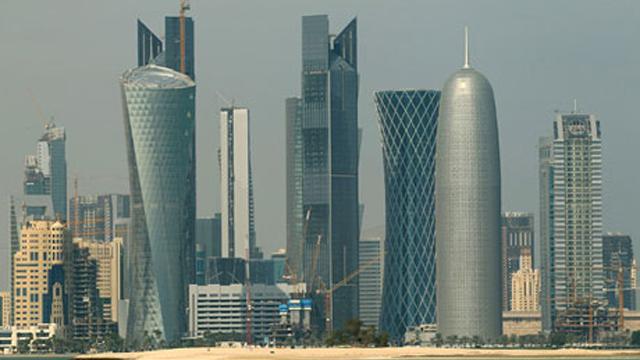
Of all the delegations in the room in Doha, the Canadians adopt the lowest profile. Some question whether they should be there at all.
The country's first and only Green Party MP, Elizabeth May, said: "Having Canada in the room negotiating to weaken the second Kyoto, when we have already signaled that not only will we not be participating in taking on new targets in the second period but we're legally withdrawn from the Protocol, should make us pariahs." "I can't imagine how anybody would want us in the room."
Canada's current greenhouse gas (GHG) emissions are 23% over the country's Kyoto Protocol target, and federal government estimates place Canada 28.8% over the target by 2014. Canada is the only country to have repudiated Kyoto, the sole legally binding international policy tool to date to deal with the emissions, and ranks just behind the U.S. and Australia in the table of worst global emitters per capita.
This is because of Canada's size, its cold climate and its resource-based economy, especially the energy-intensive, carbon-emissions-heavy oil boiled from large swaths of bitumen know as the Alberta tar sands.
Canada holds the world's third-largest oil reserves, mostly concentrated in the western province of Alberta, the region that is the largest emitter of greenhouse gases. Where most provinces' GHG emissions have stabilized since 1990, Alberta's emissions have increased by 41%.
The cornerstone of Prime Minister Stephen Harper's policy has been to try to approve key pipelines, such the Keystone XL, from Alberta to Texas, the Enbridge Northern Gateway, from Alberta to the West Coast, and Enbridge Line 9, an eastbound pipeline reversal that could see tar-sands crude pumped to Quebec and the Atlantic coast.
Harper's 2012 budget bill, called C-38, replaced the entire Environmental Assessment Act in order to "streamline" approval of major oil and gas pipelines. The 2011 budget slashed funding for Environment Canada by over $222 million, with cuts specifically to departments dealing with climate change, clean air, waste management and water resources.
"The environment assessment regime put in place in the past year would be a laughing stock in a developing country," said May. "We have a government that is less concerned about climate than the CEOs of major oil companies."
Canada has increasingly "harmonized" its energy and climate policy with the U.S., and in Copenhagen followed it on a non-binding agreement to "reduce emissions by 17% below 2005 level by 2020". But Canada-U.S. harmonization stops when it comes to investing in clean-energy jobs: were Canada to match the U.S. on a per person basis, it would invest an additional $11 billion. Canada provides less clean-energy stimulus than Saudi Arabia, China, Australia, France or the U.S.
A recent study by labor and environmental groups estimates Canada could create more than 20,000 jobs if it invested the annual $1.3 billion tax subsidy currently given to oil, coal and gas companies in emerging energy sectors such as wind, solar power and home retrofits.
————————————————————————————————————————————
Holding a climate-change conference in Qatar, the country with the world's highest per capita carbon emissions, might seem like a joke, but the UN isn't renowned for its sense of humor. This year's fraught negotiations on a replacement for the Kyoto protocol are taking place in Doha, the Qatari capital, where they are fueled by some of the most inefficient, profligate, carbon-spewing power generation in the world.
Qatar makes most of its money – GDP is $170 billion a year – from selling oil and gas. It has the world's third-biggest natural gas reserves and is the top supplier of liquefied natural gas, according to the U.S. government's Energy Information Administration.
As delegates shiver in the Arctic (and Arctic-melting) air-conditioning, the Qatari government is raking in $230 million every day from exporting fossil fuels. Despite the huge potential for solar power, there are no renewables to speak of.
On top of that, Qataris get all their electricity, water and even phone lines free, and the price of these for expats (the majority of the 2 million inhabitants) is state-subsidized. They have no concept of "fuel poverty." Or any kind of poverty – the average income is $90,000 a year, the highest in the world. With those prices, everyone uses energy as much as they can, all of the time. Doha's skyscrapers, vast shopping malls, its lavish apartments and swanky hotels are among the most energy-inefficient in the world. Each Qatari is responsible for nearly 50 tonnes of carbon emissions a year. That compares with 17 for the U.S., 1.4 for India and 0.1 for Uganda. Meanwhile, scientists have warned that on current form, the world will be in for between 4°C and 6°C of warming.
Campaigners who have traveled to Doha to protest against governments' inaction on global warming, and the snail's pace of the negotiations, have no choice but to use Qatar's climate-killing energy. Even pouring a glass of water involves hurting a polar bear – the water in this desert country comes from desalination plants, and making seawater drinkable is one of the most energy-intensive processes. But water it is, if you want a drink – alcohol is banned, and thirsty delegates were searched at the airport to make sure they didn't smuggle any in.
The Qatari government, even though it volunteered to hold the conference, seems rather bemused by it. Qatar, which will hold the football World Cup in 2022, is trying to develop an international reputation for hosting big events and it seems quite possible that agreeing to hold the UN on climate was purely a reflex action. The government may be regretting it. Abdullah Bin Hamad al-Attiyah, the former Qatari oil minister who is hosting the conference, was ridiculed when he said: "We should not concentrate on the per capita [emissions]. We should concentrate on the amount from each country." For climate talks, that is heresy.
Fiona Harvey
3 WAYS TO SHOW YOUR SUPPORT
- Log in to post comments
















